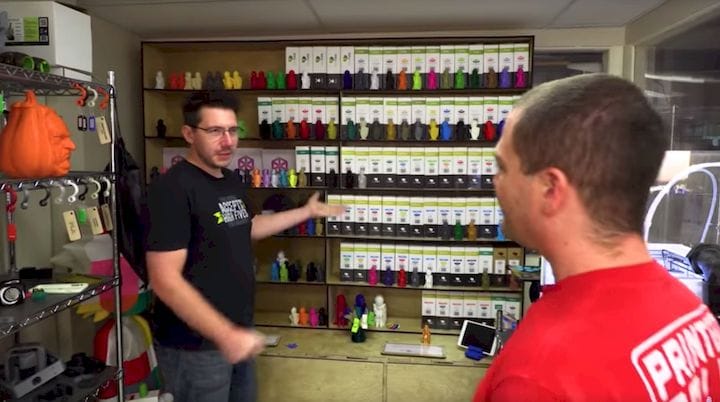![Joel Telling’s visit to Printed Solid illustrates some trends in 3D printing [Source: 3DPN]](https://fabbaloo.com/wp-content/uploads/2020/05/image-asset_img_5eb09dd1962ec.jpg)
There is so much competition smaller 3D print vendors might consider consolidating to expand.
I’m watching a video made by Fabbaloo friend Joel Telling, a.k.a. The 3D Printing Nerd, where Joel visits the Printed Solid headquarters in Delaware, just south of Philadelphia. I had some thoughts after seeing what these folks are doing.
Printed Solid is a long-time 3D print reseller, offering a wide selection of interesting materials for 3D printers, including several notable brands such as colorFabb, Taulman and Proto-pasta. They also offer a number of desktop 3D printer units from well-regarded vendors like Ultimaker, LulzBot and Raise3D.
In the video Joel is shown the Printed Solid operation, which, as you might expect, is focused not only around inventory and shipping, but is also heavily focused on ensuring customer success through demonstrations, explanations and service, like any good reseller should provide.
![Joel Telling inside Printed Solid’s warehouse [Source: 3DPN]](https://fabbaloo.com/wp-content/uploads/2020/05/image-asset_img_5eb09dd1e6aa7.jpg)
Trust is perhaps the major factor in a reseller, and it appears Printed Solid is an honorable operation, even going as far suspending activities with popular supplier Creality over open source GPL violations.
But then the really interesting part happens.
It seems that Printed Solid has merged with another nearby company.
They now have additional manufacturing capabilities, as the new functions include laser cutting and engraving, milling, marking and more. One of the most popular items produced is actually enclosures for 3D printers.
![Printed Solid now offers manufacturing services, such as laser engraving [Source: 3DPN]](https://fabbaloo.com/wp-content/uploads/2020/05/image-asset_img_5eb09dd239483.jpg)
I find this development quite interesting, as it shows two trends apparent in 3D printing these days.
First, there is a tremendous amount of competition in the reseller market. How many vendors now source 3D printer filament? Dozens. Hundreds, perhaps even thousands. When 3D printing was a very small niche market a few years ago, there were relatively few sources for materials. These tended to be a few online services that shipped to larger regions.
However, in recent years there have been more outlets picking up the idea of providing materials for 3D printers, vastly enlarging the possible sources for materials for operators. I’ve even seen electronics and supply physical brick and mortar stores start selling spools of filament, as well as larger online shops that focus on other types of products.
This is now a very tough market to compete within, and it requires considerable effort to maintain that important trust factor with clients. It’s likely also putting some financial pressure on resellers who face this level of competition.
Secondly, there is an increasing recognition that 3D printing is simply another type of making process, rather than an end to itself. The goal of everyone is to make functional, artistic or structural objects, not to make “3D prints”. The buzz about 3D printing in the past few years somewhat distracted the market from this concept, where some felt that the 3D printer is the start and end of the making process.
It’s just not true — even 3D prints frequently require post-processing, and very often the useful devices being prototyped require electronics, laser cutting and other types of making processes.
In other words, clients need more than just 3D printing. Why not offer those services?
That’s what I think might be going on at Printed Solid: they may be feeling the need to consolidate to provide additional function and offer some market diversity over just reselling 3D printer materials and equipment.
Others in the space have also been exploring similar diversification: colorFabb themselves now resell Stacker’s 3D printer equipment, for example.
Expect to see more of this type of consolidation to occur in other areas in the 3D printing industry, as companies seek to diversify their operations to hedge against competition and meet the needs of more clients.
Via 3D Printing Nerd (YouTube)











Formlabs just issued three new videos for beginners to 3D printing, and the result was quite surprising.